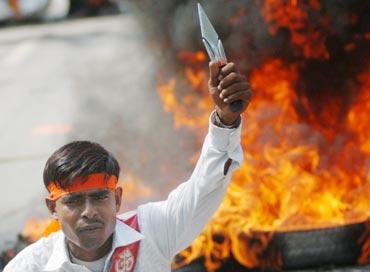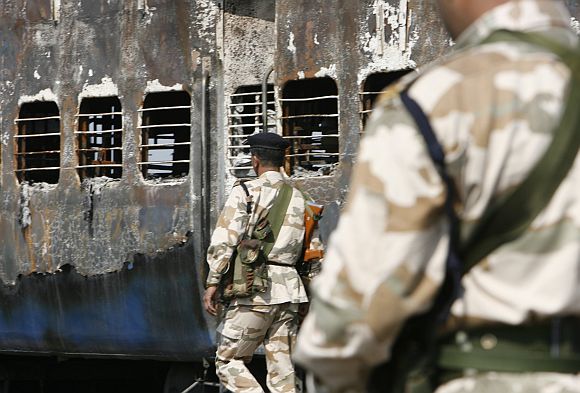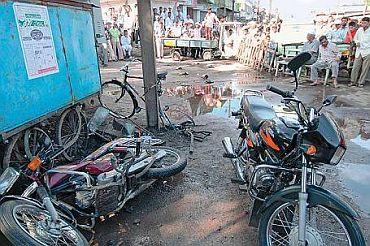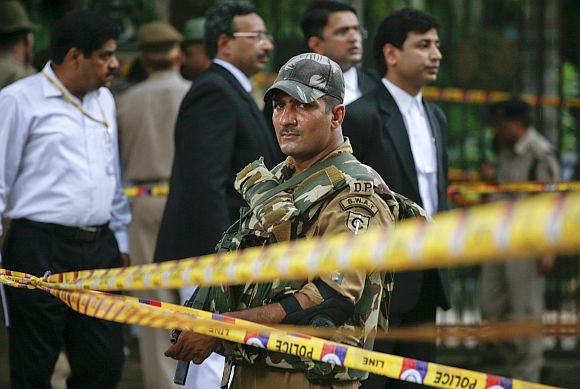Photographs: Pawan Kumar/Reuters Vivek Gumaste in New Delhi
Is the focus on 'saffron terror' a deranged attempt at politically counterbalancing Hindus and Muslims with little regard for ethical impropriety? asks Vivek Gumaste.
There is something radically wrong with the entire picture; the pieces of the puzzle do not align with each other despite attempting every possible combination; and the key does not open the lock. The foremost investigating agency in the nation, the National Intelligence Agency, despite its extensive reach and limitless resources and despite the fact that the theatre of operation for this specific sleuthing lies within its ambit, continues to fumble in the dark trying desperately to unearth tangible evidence that would nail the culprits responsible for acts of violence branded as 'Hindu terror.'
Such a dead end scenario calls for serious introspection and compels us, willy nilly, to explore the logical options underlying this predicament. Is it possible that our investigating agencies are just plain incompetent and lack the acumen to crack these cases? Not a credible excuse.
For in multiple other instances of terror, even when they have involved complex conspiracies hatched abroad, our security agencies have been eminently successful in garnering evidence and prosecuting the criminals in a court of law. Then what is the rational explanation for this fiasco?
Is it possible that definite evidence is not forth coming because none exists? A rhetorical question that is heresy to some but a query that just cannot be evaded especially in light of the political hype surrounding this controversy.
...
Cases of Hindu terror
Image: Rapid Action Force personnel stand guard besides a burnt carriage of a Samjhauta Express train in Deewana, near Panipat town, on February 19, 2007.Photographs: Desmond Boylan/Reuters
Central to the hypothesis of Hindu terror are a three bomb blasts namely the ones at Malegaon (September 29, 2008), Mecca Masjid in Hyderabad (May 18, 2007) and Ajmer Sharif (October 11, 2007). The explosion aboard the Samjhauta Express is also being investigated from this angle.
Let us look at some specific details to examine the validity of these charges.
Samjhauta blast case
1. In 2008, Safdar Nagori chief of the Nagori faction of the banned Students Islamic Movement of India is alleged to have admitted to a SIMI involvement in the attack under narco-analysis testing.
2. Later in November the same year, the Maharashtra ATS investigating the Malegaon blast, probes Lieutenant Colonel Srikant Purohit's role in the Samjhauta case and comes up empty handed. The charge-sheet against Purohit fails to make any reference to the Samjhauta blast, testifying to the lack of plausible evidence.
3. In 2010 Swami Aseemanand, a Hindu religious leader admits before a magistrate about the involvement of Hindu terror groups in the Samjhauta blast and other terror acts. He later retracts his statement claiming that the confession had been extracted under duress.
...
'No open and shut cases of Hindu terror'
Image: The scene of the 2006 blast in MalegaonMalegaon attack
Attempts to implicate Purohit are in a state of limbo as an army investigation has failed to reveal any evidence of missing RDX which Purohit is supposed to have pilfered to plan the blast.
Additionally, reports released in August 2010 from the US Department of State hold the Lashkar-e Tayyiba and the Harakat-ul Jihad Islami responsible for the Samjauta Express and Mecca Masjid bomb blasts respectively:
"Arif Qasmani is the chief coordinator of LeT's dealings with other organizations.......... Qasmani has worked with LT to facilitate terrorist attacks, including the July 2006 train bombing in Mumbai and the February 2007 Samjota Express bombing in Panipat, India."
US Dept of State Release August 5, 2010
"HUJI is also responsible for terrorist attacks in India including the May 2007 Hyderabad mosque attack, which killed 16 and injured 40, and the March 2007 Varanasi attack, which killed 25 and injured 100."
US Dept. of State Release August 6, 2010
The noted security expert B Raman rightly points out the incongruity of these two widely differing investigations (Arrest of Some Hindus as Terrorists: Curiouser & Curiouser. South Asia Analysis group. August 7, 2010 ):
"Thus, according to American investigators the LeT and Al Qaeda were responsible for the Samjauta Express blast and the HUJI for the Mecca Masjid blast. If the American investigators, who have better sources in Pakistan, are correct, how can our investigators claim that some arrested Hindus were responsible for these incidents?"
Therefore these are not open and shut cases. There is no hard evidence. In fact, findings from different sources conflict with each other and have giant sized question marks imprinted all over them. Moreover, the investigation falls back two paces for every one step forward underlining the nebulous nature of the evidence unearthed so far.
...
'Directing resources to chase non-existent problem would be a fatal mistake'
Image: A Delhi police special force personnel keeps vigilPhotographs: Reuters
Ever since Union Home Minister P Chidambaram coined the term, 'saffron terror', there has been a relentless campaign to highlight this phenomenon by repeated incantation and the floating of bizarre conspiracy theories; one of which implicates Hindu terror outfits in the death of Hemant Karkare, the ATS chief killed during the 26/11 attacks in Mumbai.
It is such outlandish and contrived notions that make one wonder about an ulterior political motive fuelling this inquisition. Is 'Hindu terror' a convenient bogey aptly termed to expeditiously feed into the polemics of India's divisive communal politics and an entity deliberately blown out of proportion to assuage the sentiments of a wider Muslim community reeling under the onslaught of collective blame (wrongly though it may be) emanating from the misdeeds of a few amongst them?
And in other words, is this a deranged attempt at politically counterbalancing Hindus and Muslims with little regard for ethical impropriety?
If talk of Hindu terror was harmless banter or merely an exercise in political one-upmanship, one would be least concerned. But this brouhaha is a dangerous game that has serious repercussions on India's fight against terror acting as a distraction that not only compromises our efforts but puts us diplomatically on the backfoot vis-a-vis Pakistan.
It is nobody's contention that we condone or ignore the violence perpetrated by Hindu groups. The investigation can continue. But at this stage it would be a fatal mistake if we directed all our energies and resources in trying to chase a non-existent problem at worst or an insignificant one at best and ignore the 800 pound gorilla in the room: Pakistan inspired locally aided terror.





article